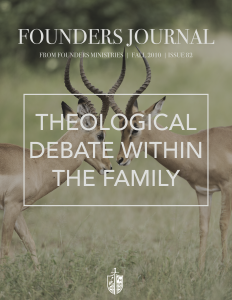The debate over Calvinism and Arminianism has been ongoing for four hundred years. The theological issues involved in the debate, of course, extend back much further. Those who take God’s Word seriously have sometimes come down far apart in their understanding of the nature of God’s sovereignty and grace and, more specifically, His sovereignty in grace.
There was a great theological consensus on this issue at the founding of the Southern Baptist Convention. The Second London Baptist Confession of Faith, published in 1689, was the most influential confession among Baptists in America in the late eighteenth and early nineteenth centuries (often distributed in the forms used by the Philadelphia or Charleston Baptist Associations).
This confession is thoroughly Calvinistic and was particularly influential among Baptists in the southern United States. As Timothy George has noted, “Each of the 293 ‘delegates,’ as they were then called, who gathered in Augusta to organize the Southern Baptist Convention [SBC] in 1845, belonged to congregations and associations which had adopted the Philadelphia/Charleston Confession of Faith as their own.”[1]
That doctrinal consensus within the SBC broke down over the next seventy-five years, opening the door to widespread pragmatism and creeping liberalism by the middle of the twentieth century. The conservative resurgence, as it has come to be called, dominated SBC life in the last two decades of that century. With the dawning of the twenty-first century, Southern Baptists were once again firmly confessing confidence in the full authority and inerrancy of the Holy Scriptures.
Within that resurgent inerrancy movement, there was a growing, often undetected resurgence of confessional Calvinism. By the early years of the twenty-first century the return to the SBC’s confessional heritage had become so widespread that it became the subject of newspaper, magazine and journal articles. It also became the target of many Arminian-leaning SBC leaders. With the emergence of the blogosphere, Southern Baptist advocates of confessional Calvinism, many of whom were in the younger, rising generation, began to push back against their attackers.
The debates that were sparked by this new form of communication often were characterized by unguarded and even acrimonious accusations. Extremists on both sides seemed intent on keeping the divide as deep and wide as possible, rarely giving each other the benefit of the doubt and often misrepresenting their theological disputants rather than honestly trying to understand them.
But in the middle of the last decade there also were efforts made by some Calvinists and non-Calvinists to reach out to each other in order to explore areas of agreement and common commitments. The resulting relationships that developed through those efforts began to create real hope that there could be genuine fellowship and cooperation among those who fall at different points along the Calvinism-Arminianism divide.
Where the gospel is rightly understood, affirmed, and given the preeminent place in faith and life, genuine, rich fellowship and meaningful cooperation can exist among God’s people. The differences that we have are not ignored or dismissed as unimportant, but they are maintained with the kind of humility that becomes those whose Master humbled Himself to the point of death on a cross.
It was out of this developing atmosphere that the idea for the Building Bridges conference was birthed in February 2007. The goal was to bring together Southern Baptists of any and all theological persuasions to hear presentations by those who disagree on certain points of Calvinism/Arminianism. LifeWay Christian Resources hosted the meeting and Southeastern Baptist Theological Seminary and Founders Ministries sponsored it. The conference, marked by rigorous and respectful theological dialogue, demonstrated that Southern Baptist Calvinists and non-Calvinists can come together around the gospel without compromising doctrinal convictions.
The papers that were presented at the Building Bridges conference were compiled and published in a book, edited by Brad Waggoner and Ray Clendenen in 2008, called Calvinism: A Southern Baptist Dialogue. After the conference but before the book was released, Jerry Vines announced the “John 3:16 Conference” that would be held in November 2008. Steve Lemke, Provost of New Orleans Baptist Theological Seminary, noted that the conference was “intended as a majoritarian Southern Baptist response to the ‘Building Bridges’ and ‘Together for the Gospel’ conferences.”
The papers presented at the John 3:16 Conference (jointly sponsored by Jerry Vines Ministries, New Orleans Baptist Theological Seminary, Southwestern Baptist Theological Seminary, Liberty Baptist Theological Seminary, Luther Rice Seminary and Midwestern Baptist Theological Seminary) were also compiled (together with five additional chapters) and published in 2010 as Whosoever Will: A Biblical-Theological Critique of Five-Point Calvinism, edited by Lemke and David Allen, dean of the School of Theology at Southwestern Baptist Theological Seminary.
That book has been widely acclaimed by Arminians of various stripes. Most recently, Roger Olson of Baylor University, has given it high praise and commends “Editors David L. Allen and Steve W. Lemke and their collection of anti-Calvinist authors [for] boldly step[ing] where few have dared to step in recent years.”
As a self-described “classical Arminian,” Olson professes shock over Jerry Vines’ statement that “none of the authors in this project is Arminian or a defender of Arminianism.”[2] “I was stunned,” Olson says, “because I read much of the book before going back and reading Vines’ sermon that introduces it. In fact, all of the authors are Arminians in the classical sense. I don’t know why Vines and they run from the label.” Love requires that we not simply label the contributors to Whosoever Will “Arminian” when they plainly reject that characterization. Historical accuracy and theological integrity, however, require that we identify many of their arguments and positions as nothing other than that.
This issue of the Founders Journal provides a selective review of and response to Whosoever Will. The purpose is to provide the kind of serious engagement that the book deserves. Anything less than a ruthlessly biblical response would dishonor the authors, all of whom are fellow-servants of our common Lord. In addition to the critiques that follow, Ken Keathley has written “An Appreciative Reply” to Tom Nettles’ extended critique of Keathley’s book, Salvation and Sovereignty: A Molinist Approach, which was published in the last issue of the Founders Journal (FJ 81). Keathley is one of the contributors to Whosoever Will and the inclusion of his reply to Nettles demonstrates our desire for the kind of fraternal exchange that brothers ought to be able to have even when discussing disagreements over vitally important matters.
Matthew Barrett critiques the exegetical and theological arguments that are found in Steve Lemke’s chapter on irresistible grace while Ben Rogers exposes some of the historical inaccuracies in David Allen’s chapter on the atonement. Tom Nettles rounds out this issue by providing a brief, selective review of the whole book.
Truth matters. And the cause of truth will not be served by glossing over differences that we have in any areas with fellow-believers. Such differences ought to be explored with every position being forced to stand up under the intense scrutiny of Scripture. When this is done with respect for each other and devotion to God’s Word, such engagements can be tremendously profitable. That is the hope of this issue of the Founders Journal.
[1] Timothy and Denise George, general editors, Baptist Confessions, Covenants, and Catechisms (Nashville, TN: Broadman and Holman, 1996), 11.
[2] David L. Allen and Steve W. Lemke, editors, Whosever Will: A Biblical-Theological Critique of Five-Point Calvinism (Nashville, TN: B&H Academic, 2010), 5.






















